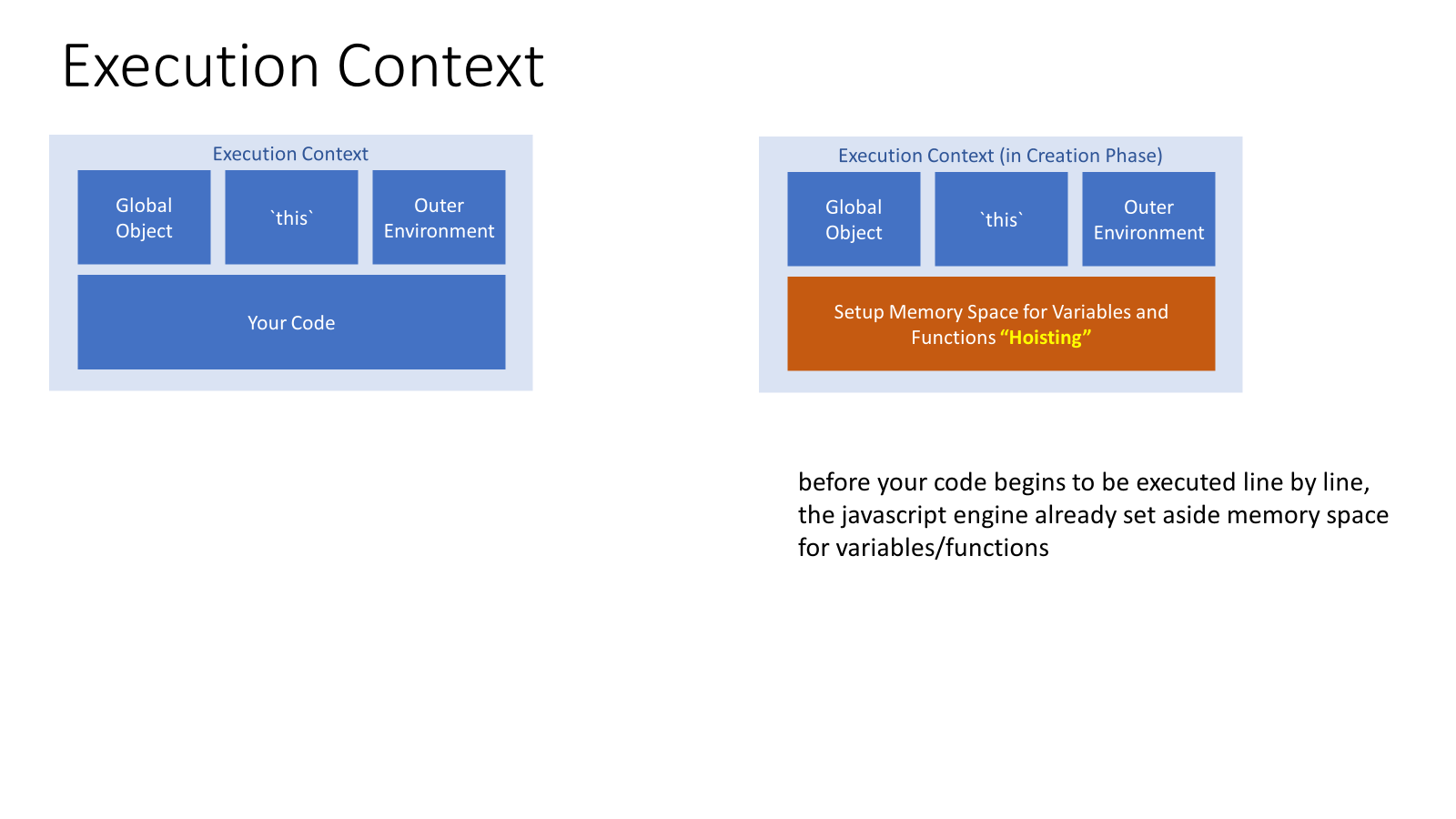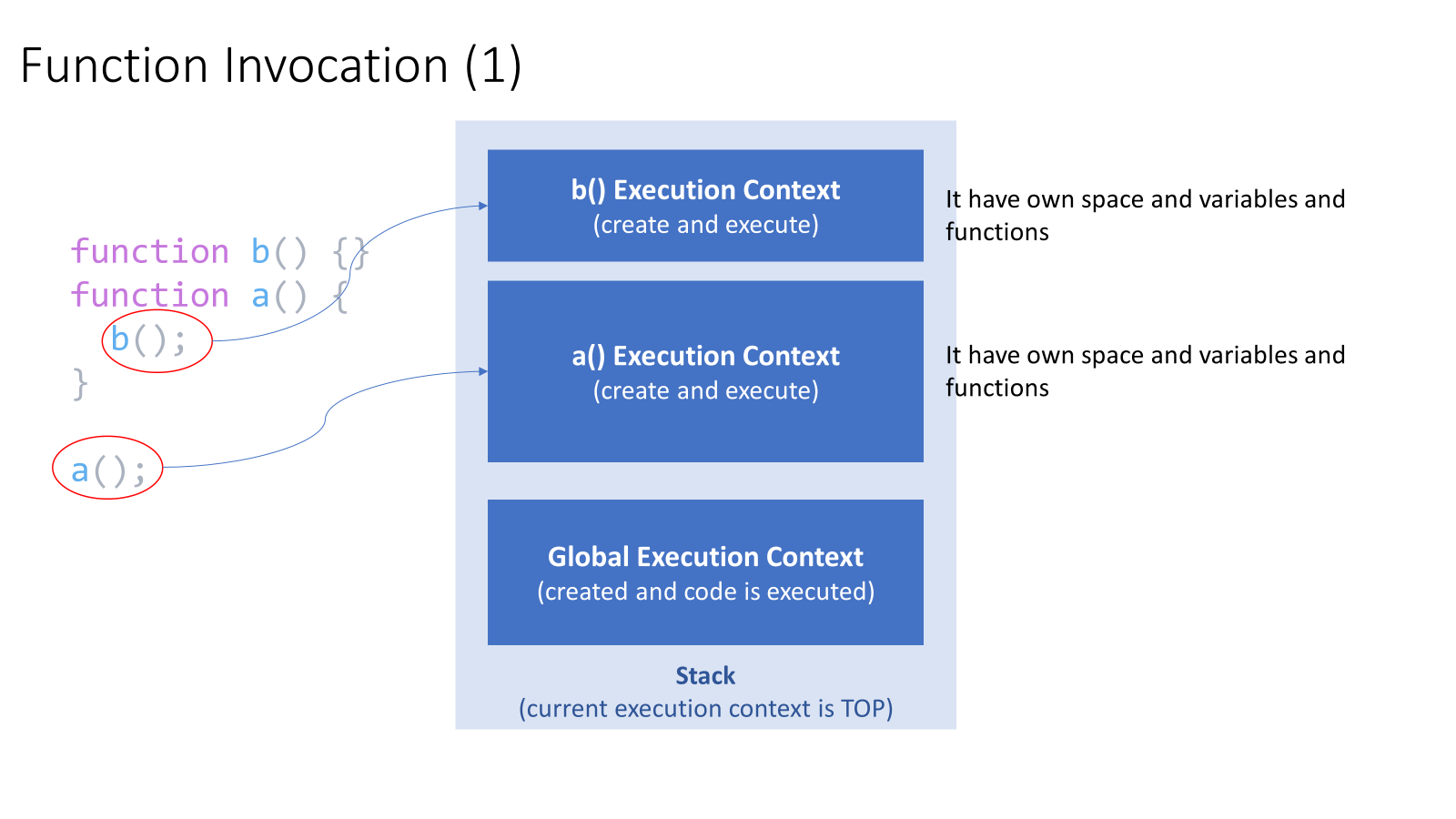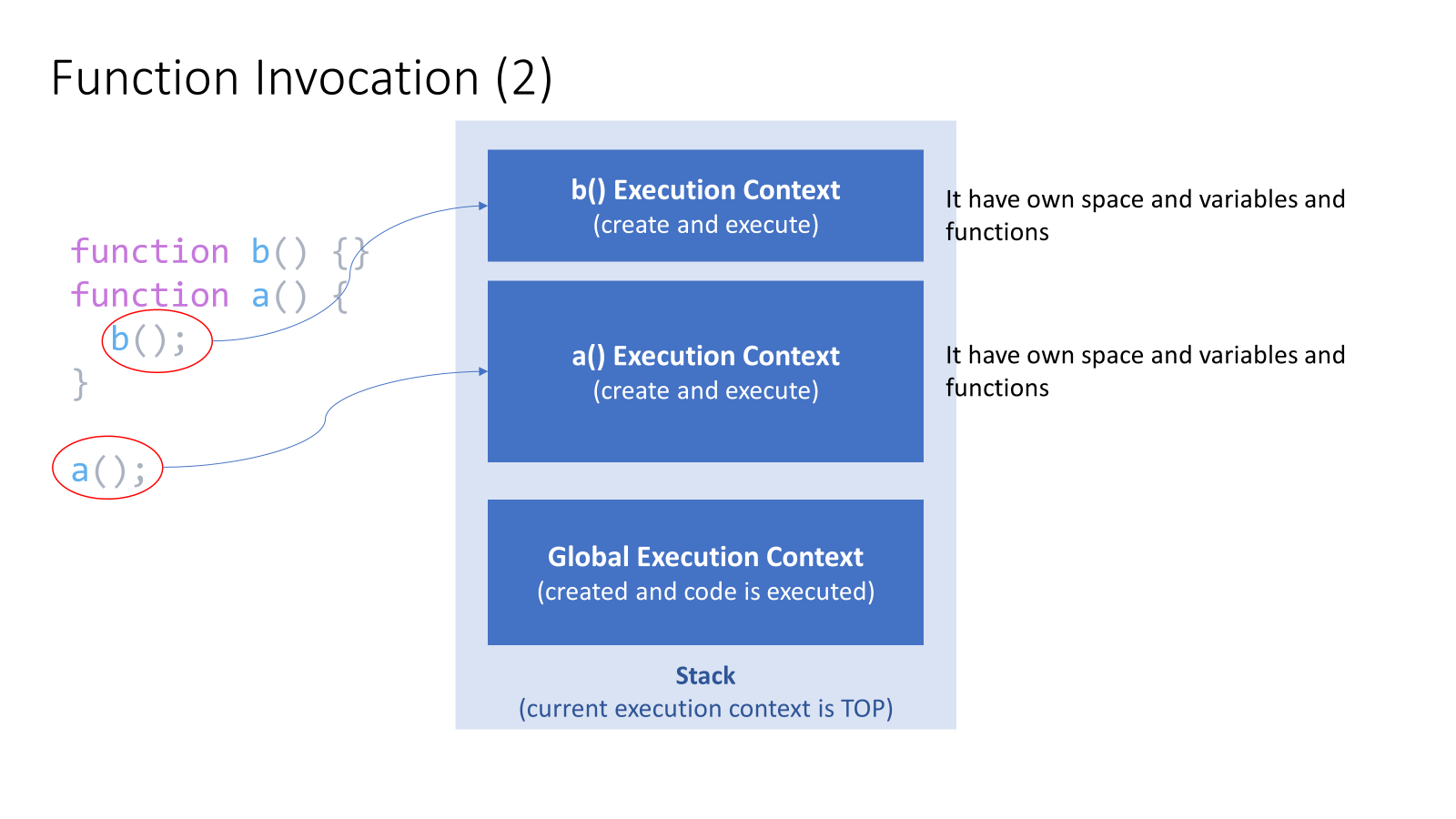Execution context in Javascript
This is a sample post intended to test the followings:
- A different post author.
- Table of contents.
- Markdown content rendering.
- Math rendering.
- Emoji rendering.
Setup
- Chrome
- https://brackets.io/ or VS Code (With Live Server Extenstion)
BIG WORDS ALERT
- Systax Parser
- Lexical Environment
- Execution Context
Global Environment and Global Object
- When code is run in Javascript, it run inside
Execution Context(Global) Execution Contextcreate 2 things:Global Object: in browers iswindow(different thannodeJS). If we have a seperate tab that would be a seperat3eglobal object(each tab is hold aExecution Context)this
Globalmean:- Not inside a Function
Creation and Execution Phase (by Javascript Engine)

-
Phase 1: Creation 3 things and setup memory space (at creation time)
Global ObjectthisOuter Environment
Then the parser will go thought your code for translation: to recognize where your created variables and where you created functions.
- Hoisting (setup memory space) before your code begins to be executed line by line, the javascript engine already set aside memory space for variables/functions Functions are entirely is placed into memory space: function name, function code (then we can call the function before declaration)
ExecutionContext of function is Created (CREATION PHASE)
- Phase 2: Execution time. The code will be execution line by line
b(); // We can call b function rightnow. Printout: called b
console.log(a); // We can use `a` variable (because in the creation phase, a will be availabe, but the value will be setup is `undefined`
var a = "Hello World"; // In execution time, a will be setup is "Hello World"
function b() {
console.log("called b");
}
Single Thread and Synchronous Execution
- Javascript behave Single Thread/Synchronous Execution: One at a time
Function Invocation and Execution Stack
- Function Invocation: by using ()


function b() {}
function a() {
b();
}
a();
-
Step 1: Create
Global Execution Contextand setup memory spaceb,awill be in memory
-
Step 2: Execute the code line by line.
- Hit
a(): invoke functiona
- Hit
function a() {
b();
var c;
}
function b() {
var d;
}
a();
var d;
-
Step 1: create
Global Execution Context:GlobalExecutionContext = { a: f, b: f, d: variable }; Stacks = [GlobalExecutionContext]; -
Step 2: hit
a()invoke functiona. ThenExecution Contextof a will be createdExecutionContext(a) = {c: variable, } Stacks = [GlobalExecutionContext, ExecutionContext(a) <- current]Then execute
a()line by line » hit b() -
Step 3: hit
b()ExecutionContext(b) = {d: variable} Stacks = [GlobalExecutionContext, ExecutionContext(a), ExecutionContext(b) <- current] -
Step 4:
- Finish
b()» popupExecutionContext(b)ofStacks
Stacks = [GlobalExecutionContext, ExecutionContext(a), ExecutionContext(b) <- pop up]; Stacks = [GlobalExecutionContext, ExecutionContext(a)];- Then finish
a():
Stacks = [GlobalExecutionContext, ExecutionContext(a) < -popup]; Stacks = [GlobalExecutionContext]; - Finish
Functions, Context and Variable Environments
-
Variable Environment: WHERE variable LIVE
-
What is
myVarin anypoint time ? » Scope
// Step 3: b() is invoke
// GlobalExecutionContext = {myVar: 1}
// ExecutionContext(b) = {myVar: undefined}
// Stacks = [GlobalExecutionContext, ExecutionContext(a), ExecutionContext(b)]
function b() {
var myVar;
console.log(myVar);
}
// Step 2: a() is invoked
// GlobalExecutionContext = {myVar: 1}
// ExecutionContext(a) = {myVar: 2}
// Stacks = [GlobalExecutionContext, ExecutionContext(a)]
function a() {
var myVar = 2;
console.log(myVar);
b();
}
// Step 1
// GlobalExecutionContext = {myVar: 1}
// Stacks = [GlobalExecutionContext]
var myVar = 1;
console.log(myVar);
a();
SCOPE CHAIN
-
Javascript Engine don’t look ONLY the current execution context
-
Every
ExecutionContexthasOuter Environment. In the bellow case, both ofExecutionContext(a)andExecutionContext(b)have Outer Environment areGlobalExecutionContext:ExecutionContext(a).outerEnv = ExecutionContext(b).outerEnv = GlobalExecutionContext
Although
afunction invokebfunction (Execution(a) is below Execution(b) in stacks) BUTbis sitting on the same code witha, they refer the same global execution context (lexical enviroment). This one is setup at the code (creation time), not the calling time -
Scope chain: the links of
outer environmentreferences.Outer Environment: physically, where is code is settingouter environmentrefer to WHO create me ?
function b() {
// ExecutionContext(b) = {}
// ExecutionContext(b).outerEnvironment (lexical) = GlobalExecutionContext
console.log(myVar);
}
function a() {
// ExecutionContext(a) = {myVar: 2}
// ExecutionContext(a).outerEnvironment (lexical) = GlobalExecutionContext
var myVar = 2;
console.log(myVar);
b();
}
// GlobalExecutionContext = {myVar: 1}
var myVar = 1;
console.log(myVar);
a();
- Now we change scope lexical environment of function b: put inside function a
function a() {
// ExecutionContext(a) = {myVar: 2}
// ExecutionContext(a).outerEnvironment (lexical) = GlobalExecutionContext
function b() {
// ExecutionContext(b) = {}
// ExecutionContext(b).outerEnvironment (lexical) = ExecutionContext(a)
console.log(myVar);
}
var myVar = 2;
console.log(myVar);
b();
}
// GlobalExecutionContext = {myVar: 1}
var myVar = 1;
console.log(myVar);
a();
let - block scoping
- Block begin/end at {}:
- If statement
- For..loop
What about asynchronous callbacks ?
- Since Javascript is synchronous, how this handle
asynchorousevents ?
(create and execute)") B("a() Execution Context
(create and execute)") C("Global Execution Context
(create and execute)") end subgraph eventQ["Event Queue"] E("Click") F("Http request") end stack <--push function handle of event (clickHandler)-->E stack <--push function handle of event (HttpRequestHandler)-->F
- Javascript engine won’t look at the
event queueuntillstackis empty
Types
- Javascript use Dynamic Typing
var isNew = true; // No errors
isNew = "yup !";
isNew = 1;
- Primitive types
- Type of data that represents a single value
undefined: variable is not set (by JS Engine). Not recomment to set manuallynull: can be set manually.boolean:true|falsenumberstringsymbol(ES6)
Operators
- Operators: a specical functions take 2 parameters and return 1 result
infixnotation:+(3, 4) = 3 + 4
